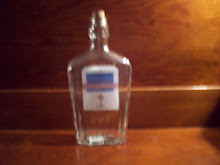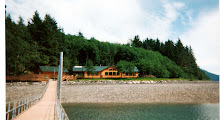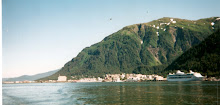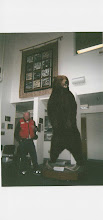by Robert L.Gisel
The dog sled racing season is really heating up in Alaska. The Kusko 300 just completed with a surpise win, the 1000 mile Yukon Quest is well enrolled in February, and the Iditarod comes up in March with 69 sign-ups so far. All told there are nearly a dozen mid-range and long range sled dog races in Alaska.
The finish of the Kuskokwim 300 Sled Dog Race sees Rohn Buser first across the line. That is Rohn, not his four time Iditarod winning father Martin. This is an outstanding win for Rohn, considering the high caliber of his opponents in the all-out dash for the $20,000 prize for first place.
This is a high-purse race that pays prize money all the way to 20th place, you just have to finish without scratching. This year, of 16 teams, 15 finished, one scratched, and last place still made $2500. The top 5 usually get paid $20,000, $15,000, $10,000, $7,000, $6,000, and it slides down from there to make this a popular race of the legendary racers.
This is a good race to test your dogs, so it gets a number of Iditarod veterans preparing for that key race coming up in March, or for the Yukon Quest. So far, only one of the K300 racers is entered in the Quest, Lance Mackey. 13 of the 16 racers have all run the Iditarod multiple times and all but three of the 16 have entered the 2012 Iditarod.
The list of who Rohn beat reads like the Hall of Fame Honor Roll of dog mushers. With a finishing time of 41:12:02 he beat out the rest of the top five by as little as 31 minutes, to 2 hours 26 minutes. Only 31 minutes behind him to finish second was last years Iditarod record breaking winner Greg Baker. 16 minutes behind Baker is the last years K300 winner, Paul Gebhart. Another Iditarod veteran, Lance Mackey, came in fifth, two and a half hours behind Rohn. Lance is the only Iditarod winner of four consecutive years and four consecutive wins of the Yukon Quest, said to be the toughest of them all, that runs 1000 miles between Fairbanks and Whitehorse, Canada. His father, Martin Buser, another four time Iditarod winner, plus two times winner of the Kusko, finished the 300 mile race in ninth place. He won the K300 his first time in the race in 1994. All told, competition was tough, the best of the best.
Rohn's time averages to about 7.3 miles per hour, including all the stops and the four hour mandatory layover at Tulusak, making this a fairly high speed race. Rohn comments that his dogs did all the right things, stayed happy, ate when they should and slept when they should so team and driver were tracking together well. Sunday morning they mushed through a headwind and chill factors to 50 below.
He started with 13 dogs, as one of his pick got loose and went AWOL before the race, and finished with 10. He and his father brought 28 dogs from their 100 dog kennel and divided them up. Looks like Rohn got the fastest dogs, or else they just cooperated well with him for the race. By winning this Rohn has made himself known as one of the best in dog sled racing.
It you have observed the dogs when staging for a race they are excited and their eyes are bright as they leap up and down raring to go. This is what they live for. They get to travel, go on beautiful road trips, get their picture taken lots, and eat steak when they win or finish well. Alaska celebrities.
A couple other race wins are worth mentioning. Bill Kornmuller wins the two day speed classic in 1:21:32. For the 32 mile race that is an average of 21.3 mph. We are talking fast dogs! In 17:41:19 Jennifer peeks became the first woman to win the Bogus Creek 150.
There is still time to book your flights to Fairbanks and Anchorage to catch the action of the long range Iditarod and Yukon Quest races. It you haven't been training with your dogs, it is too late to enter these.
HOME
[]
Wednesday, January 25, 2012
Subscribe to:
Post Comments (Atom)











No comments:
Post a Comment